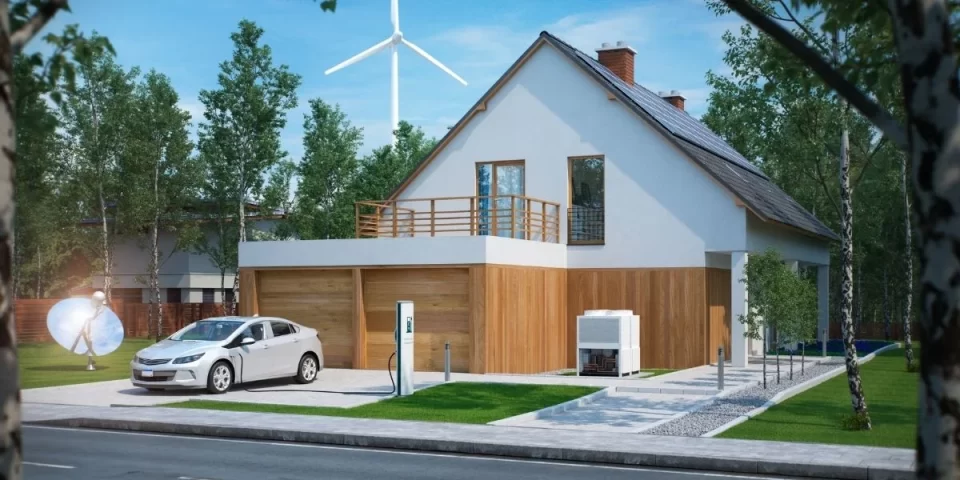Net zero homes are a growing trend in the home building industry. These homes use as much energy from renewable sources as they put back into the grid, creating a closed loop system where you can live off-the-grid without any electricity bills. Net zero homes also provide many benefits beyond just saving you money on your utility bills: they’re environmentally friendly and can help reduce your carbon footprint, improve your home’s resale value, and make your family more comfortable year-round.
What is a net zero home?
A net zero home is a house that produces enough energy to meet its own needs, not only for electricity but also for heating and cooling. In other words, a net zero home is one that does not require any outside energy sources to operate — and can even produce excess electricity for the grid. The term “net zero” refers to the difference between the amount of energy a home produces versus how much it uses.
In order to achieve this goal, homes must be built with energy efficiency in mind from day one. This means using high-performance insulation and windows; rooftop solar panels; on-site water treatment systems; smart appliances (think: ones that automatically turn off when not needed); efficient lighting design; high-tech climate control systems; automated shutters or blinds based on time or weather conditions…the list goes on!
Why build net zero?
- Why build net zero?
- To save money. Building a net zero home costs roughly the same as building a conventional house, so you can save money on your energy bills and pay off the construction loan faster.
- To reduce your carbon footprint. If you’re worried about climate change, then building a net zero home is one way to help reduce your carbon emissions.
- To be more energy efficient and comfortable. Net zero homes are more efficient than conventional homes because they use less power from the grid (and therefore lower costs) while also using renewable sources such as solar panels or wind turbines to generate electricity for the entire house when necessary—which means less reliance on fossil fuels and greater comfort all year round!
Benefits of net zero building
A net zero home designis an energy-efficient building that generates as much energy as it uses. This means that the home produces all of its own electricity, heat, and cool air. It also reduces your utility bills and helps the environment.
- Reduced energy consumption: When you use less electricity than what’s generated by your home’s solar panels or wind turbine, it means that you’re creating an excess amount of energy that can be sent back to the grid for others to use. This reduces strain on our nation’s power sources and makes them more efficient since they don’t have to work as hard producing electricity for everyone else at all times of day!
- Lower utility bills: With a less expensive electric bill comes increased comfort when using appliances in your home because they don’t have an impact on their own usage (like running out of hot water). Plus there are no worries about whether or not these things will work correctly when needed most–making them worth every penny spent on repairs down the road!”
How to make your home a net zero house
The benefits of having a net zero home are far-reaching and can positively impact the environment, your wallet and your physical health. Let’s take a look at some ways you can make your home net zero.
- Reduce energy use: A number of changes can help reduce energy usage in your home, including upgrading appliances with more efficient models, sealing leaks around windows and doors, adding insulation to walls and ceilings, using LED lights rather than fluorescent lights (which use less electricity), using fans instead of air conditioning during warmer months, turning off lights when leaving a room for extended periods of time (or installing smart lighting that automatically turns off after a certain period) etc.—the list goes on!
- Use renewable energy: There are many types of renewable energy sources available for homes today; solar panels are one popular option because they’re easy to install yourself or have professionally installed by contractors specializing in solar panel installation services like [Solar Panel Store](https://www.solarpanelstorenyc.com/solar-panel-installation/). Other options include wind turbines or water turbines
What’s the difference between net-zero and zero-energy?
Let’s start with the basics: what exactly is a net zero home?
To understand what “net zero” means in the context of energy, you first have to know how energy gets used. In most homes, electricity is produced by burning fossil fuels (like oil or natural gas) or hydroelectric power. This generates heat that turns water into steam to turn turbines and generate power. The grid then distributes this power to your house through wires or radio waves. A typical household might use 200 kilowatt-hours (kWh) per month; so if you paid $100 on your electric bill last month, that would mean each kWh costs 10 cents—or $20 for every 100 kWhs (1 “kilowatthour” = 1000 watt hours).
Net zero homes produce as much energy as they consume over the course of a year through renewable sources such as solar panels and wind turbines—but it’s important not to confuse net zero with zero-energy! Zero-energy buildings are designed so that they function completely off-grid and don’t need any outside assistance in order to operate efficiently; whereas net zeroes are still connected to local grids but have enough energy storage devices so that they can produce more than they consume during peak production periods like daylight hours when solar panels capture lots of sunlight.[1]
Net zero homes are a good investment in your future and will save you money.
- Net zero homes save you money.
- Net zero homes are a good investment in your future.
- Net zero homes are environmentally friendly.
Net zero homes are a great investment, and the benefits go beyond just energy efficiency. Net zero houses help to reduce our dependence on fossil fuels and make us more resilient in the face of climate change. They also provide a solution for those who couldn’t otherwise afford to build an energy-efficient home, allowing them to save money while reducing their carbon footprint. The sooner we start building net zero houses, visit us now at Hutter Architects to know more about net zero homes.

